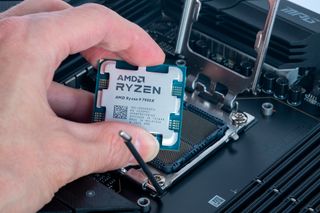Intel 600-series and 700-series motherboards have welcomed the latest 24GB and 48GB DDR5 memory modules. The same support could come to the AMD 600-series motherboards with the next AGESA firmware update.
Whether you're looking for the best RAM for gaming or work, DDR5 is improving both in frequency and capacity. The production of 24Gb dies enabled memory manufacturers to offer non-binary memory module capacities in the shape of 24GB and 48GB DIMMs. It's an attractive prospect for mainstream users that need large amounts of memory but don't want to invest in an HEDT or workstation platform.
For instance, users can have up to 192GB (4x48GB) of memory at their disposal on a regular four-DIMM motherboard. Small form factor (SFF) system enthusiasts will also be delighted at the probability of running 96GB (2x48GB) on a mini-ITX motherboard — something that a mainstream consumer could only dream of before DDR5.
As we've seen with Intel's motherboard partners, some motherboards support the latest non-binary DIMMs right off the bat while others require a firmware update. It depends on the vendor. In AMD's case, the motherboard will definitely need new firmware. Hardware leaker chi11eddog (opens in new tab), a decent source of information, claims that the upcoming AGESA 1.0.0.7 firmware should support non-binary DIMMs. AMD is likely diligently working behind the scenes to make AM5 motherboards embrace 24GB and 48GB DIMMs.
The majority of AM5 motherboards are currently on the AGESA ComboAM5PI 1.0.0.5c firmware. Only Asus has released test BIOSes (opens in new tab) for a handful of the company's AMD 600-series motherboards with the ComboAM5PI 1.0.0.6 firmware. It's safe to assume that the ComboAM5PI 1.0.0.6 firmware isn't ready for public usage yet. Assuming that chi11eddog's information is accurate, it'll take some time before AMD releases the ComboAM5PI 1.0.0.7 firmware, which is the version that reportedly arrives with support for 24GB and 48GB DDR5 memory modules.
Some AM5 motherboards can already boot with 24GB DIMMs, suggesting the lack of optimizations prevents the memory modules from working correctly on the motherboards. It should be easy to solve since we're dealing with capacity instead of frequency. First-generation Ryzen processors struggled with memory support, and the same could be said about Intel's Haswell-E HEDT chips. However, those were about memory speed. Memory capacity is probably a more straightforward matter.
Unfortunately, we haven't seen any AMD AGESA roadmaps lately, so it's uncertain when the ComboAM5PI 1.0.0.7 firmware will arrive. Vendors are just making the transition from 1.0.0.5c to 1.0.0.6, so it could be weeks or maybe even months before we start seeing 1.0.0.7 in beta BIOSes.

